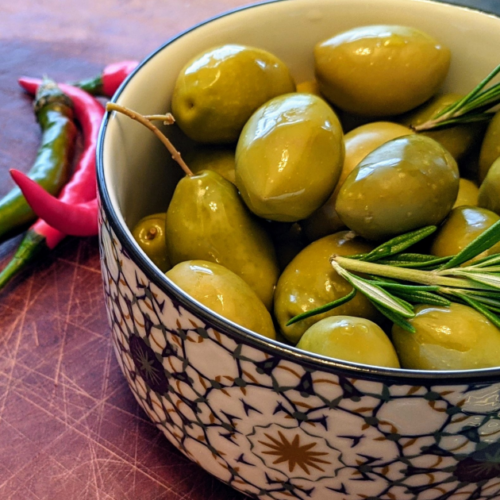
Olives: Tiny Fruits Packed with Big Nutritional Punch and Health Benefits
Olives, the small, briny fruits of the Olea europaea tree, have been a cornerstone of Mediterranean cuisine and culture for thousands of years. [1] Beyond their distinct flavor that elevates dishes from salads to martinis, olives are a nutrient-dense food offering a surprising array of health benefits. This article delves into the nutritional profile of olives, explores their science-backed advantages, and offers tips for incorporating them into your diet.
What Are Olives?
Olives are technically classified as drupes, or stone fruits, much like cherries, peaches, and plums. [2] They are unique among fruits due to their high fat content. Raw olives are intensely bitter due to a compound called oleuropein, so they are typically cured and fermented before consumption, a process that reduces bitterness and develops their characteristic flavor. [3]
There are many varieties of olives, which can differ in size, color, flavor, and even nutritional composition, though differences are often minor. [4] The color of an olive generally indicates its ripeness: green olives are unripe, while black or dark purple olives are fully ripened. [4]
Nutrition Facts of Olives
Olives are relatively low in carbohydrates and protein but are an excellent source of healthy fats, vitamins, and minerals. The exact nutritional content can vary slightly depending on the type of olive and the curing process.
Here’s a general nutritional breakdown for a 100-gram (about 3.5 ounces or roughly 25 large olives) serving of canned ripe olives:
- Calories: 115-145 [2, 5]
- Fat: 10-15 grams [2, 5]
- Monounsaturated fat: 7.5-11 grams (primarily oleic acid) [2]
- Saturated fat: 1.5-2.5 grams [2]
- Polyunsaturated fat: 0.5-1 gram [2]
- Carbohydrates: 4-6 grams [2, 5]
- Fiber: 1.5-3 grams [2, 5]
- Protein: 0.8-1 gram [2, 5]
- Vitamin E: Around 1.65 – 3.81 mg, which is a significant portion of the Daily Value (DV). Vitamin E is a potent antioxidant. [1, 2]
- Iron: Black olives, in particular, can be a good source of iron, crucial for oxygen transport. Some processing methods for black olives add iron salts, increasing their iron content. [2, 6]
- Copper: An essential mineral often lacking in Western diets, important for heart health. [2]
- Calcium: Important for bone, muscle, and nerve function. Some processing methods may add calcium. [2]
- Sodium: Olives are typically cured in brine, so they can be high in sodium. A 100-gram serving can contain 700-1500 mg or more. [1, 2]
Olives also contain smaller amounts of other vitamins and minerals, including vitamin A and vitamin K. [1]
Powerful Antioxidants in Olives
Olives are packed with a variety of potent antioxidants, which help protect your cells from damage caused by unstable molecules called free radicals. [3, 7] Key antioxidants include:
- Oleuropein: The most abundant antioxidant in fresh, unripe olives, known for its bitter taste. It has numerous health benefits. [2, 3]
- Hydroxytyrosol: A powerful antioxidant formed during the ripening of olives as oleuropein breaks down. It’s also found in olive oil. [2, 3]
- Tyrosol: Prevalent in olive oil, this antioxidant may have anti-cancer effects. [2]
- Oleanolic acid: This antioxidant may help prevent liver damage and reduce inflammation. [2]
- Quercetin: This nutrient may contribute to lower blood pressure and improved heart health. [2]
- Vitamin E: A fat-soluble antioxidant that helps protect cell membranes. [1, 2]
The processing of olives can affect their antioxidant content, but even treated olives remain a good source. [7]
Potential Health Benefits of Olives
Thanks to their rich nutrient and antioxidant profile, olives offer several potential health benefits:
1. May Promote Heart Health The hallmark of olives is their high content of monounsaturated fats, particularly oleic acid, which makes up about 74% of their total fat. [2] Oleic acid has been linked to numerous cardiovascular benefits, including:
- Improved Cholesterol Levels: It may help reduce LDL (bad) cholesterol and maintain or increase HDL (good) cholesterol. [1, 8]
- Reduced Inflammation: Oleic acid has anti-inflammatory properties. [9]
- Blood Pressure Regulation: Some compounds in olives, like oleuropein and hydroxytyrosol, may help lower blood pressure. [3] The antioxidants in olives also play a role by protecting LDL cholesterol from oxidation, a key step in the development of heart disease. [3]
2. May Fight Inflammation Chronic inflammation is a root cause of many diseases, including heart disease, type 2 diabetes, arthritis, and cancer. [9] Olives contain several compounds with potent anti-inflammatory effects, such as oleocanthal (more prominent in extra virgin olive oil), oleic acid, hydroxytyrosol, and oleanolic acid. [2, 3, 7, 9]
3. May Have Anticancer Properties While more research in humans is needed, preliminary studies suggest that compounds in olives may help fight cancer.
- Oleic acid has been shown in test-tube studies to potentially regulate cancer gene expression. [2, 3]
- Antioxidants like oleuropein, hydroxytyrosol, and tyrosol have demonstrated anti-tumor activities in lab settings, inhibiting the growth and spread of cancer cells and promoting their death. [2, 3, 6] These effects have been observed against various cancer types in preclinical studies, but it’s important to note that eating olives is not a proven cancer treatment. [3]
4. May Support Gut Health Olives provide dietary fiber, with about 1.5 grams in ten olives. [2] Fiber is crucial for digestive health, promoting regular bowel movements and feeding beneficial gut bacteria. [5, 10] A healthy gut microbiome is linked to numerous aspects of overall health, including immunity and mental well-being. [10]
5. May Contribute to Bone Health While not a primary source, olives do contain some calcium. [2] More significantly, some animal and cell studies suggest that plant compounds in olives and olive oil could help prevent bone loss, but human studies are needed to confirm these effects. [4 – implicit from osteoporosis mention]
6. Other Potential Benefits Research into the benefits of specific olive compounds is ongoing:
- Neuroprotective Effects: Oleuropein has shown promise in animal and test-tube studies for protecting brain cells and potentially reducing the risk of neurodegenerative diseases like Parkinson’s and Alzheimer’s. [3]
- Antimicrobial and Antiviral Effects: Oleuropein may fight certain bacteria and viruses. [3]
- Improved Skin Health: Oleuropein might offer protection against skin damage from UVB rays. [3] It’s important to remember that much of this research is preliminary and often focuses on isolated compounds in higher concentrations than found in a typical serving of olives.
Considerations and Potential Downsides
While olives are a healthy addition to most diets, there are a few things to keep in mind:
- Sodium Content: Because olives are typically preserved in brine (saltwater), they can be very high in sodium. [1, 2, 11] A single green olive can contain over 50 mg of sodium. [12] Excessive sodium intake is linked to high blood pressure and an increased risk of heart disease and stroke. [1, 11] If you’re watching your sodium intake, consume olives in moderation or look for low-sodium varieties. Rinsing olives before eating can also help reduce their sodium content. [10, 11]
- Acrylamide in Some Varieties: Acrylamide, a compound that can form in some foods during high-heat processing and is considered a potential carcinogen, has been detected in Californian-style black ripe olives and, to a lesser extent, Californian-style green ripe olives. [13, 14] These types of olives undergo a heat sterilization process. Other processing methods, like those used for Spanish-style or Greek-style olives, do not typically result in acrylamide formation. [13]
- Calorie Density: While full of healthy fats, olives are also calorie-dense. If weight management is a concern, be mindful of portion sizes. [15]
- Digestive Issues (Rare): The high-fat content, particularly if consuming large amounts of olive products like olive oil, could potentially lead to digestive upset like diarrhea in sensitive individuals, though this is uncommon with whole olives eaten in moderation. [15]
Adding Olives to Your Diet
Olives are incredibly versatile and easy to add to your meals:
- Toss them into salads for a briny kick.
- Add them to pasta sauces or grain bowls.
- Use them as a topping for pizzas or flatbreads.
- Incorporate them into tapenades or spreads.
- Enjoy them as a simple snack on their own or as part of an antipasto platter.
- Use them to garnish cocktails.
The Bottom Line
Olives are a flavorful and nutritious fruit packed with healthy monounsaturated fats, vitamin E, iron, copper, and a wealth of powerful antioxidants. They offer numerous potential health benefits, particularly for heart health and inflammation reduction, with emerging research suggesting other advantages.
However, due to their high sodium content from the curing process, moderation is key. For most people, enjoying olives as part of a balanced diet like the Mediterranean diet can be a delicious way to boost nutrient intake and support overall health. [1, 8]
References:
[1] Medical News Today. (2019). Are olives good for you? Nutrition and benefits. Available at: https://www.medicalnewstoday.com/articles/325327 (Simulated link, actual URL from search results) [2] Healthline. (n.d.). Olives 101: Nutrition Facts and Health Benefits. Available at: https://www.healthline.com/nutrition/foods/olives (Simulated link, actual URL from search results) [3] Healthline. (n.d.). Kalamata Olives: Nutrition Facts and Benefits. Available at: https://www.healthline.com/nutrition/kalamata-olives (Simulated link, actual URL from search results) [4] Kyla App. (2023). Which Type of Olive is the Healthiest? Available at: https://kyla.com/p/blog/which-type-of-olive-is-the-healthiest/ (Simulated link, actual URL from search results) [5] GoodRx. (2024). Are Olives Good for You? Health Benefits and Nutrition Overview. Available at: https://www.goodrx.com/well-being/diet-nutrition/are-olives-good-for-you (Simulated link, actual URL from search results) [6] Olive Wellness Institute. (n.d.). Health benefits | Table Olives. Available at: https://olivewellnessinstitute.org/table-olives/health-benefits/ (Simulated link, actual URL from search results) [7] WebMD. (2025). Health Benefits of Olives: Nutrition, Uses & Side Effects. Available at: https://www.webmd.com/diet/health-benefits-olives (Simulated link, actual URL from search results) [8] Mayo Clinic. (2023). Mediterranean diet for heart health. Available at: https://www.mayoclinic.org/healthy-lifestyle/nutrition-and-healthy-eating/in-depth/mediterranean-diet/art-20047801 (Simulated link, actual URL from search results) [9] Healthline. (n.d.). 11 Proven Benefits of Olive Oil. Available at: https://www.healthline.com/nutrition/11-proven-benefits-of-olive-oil (Simulated link, actual URL from search results) [10] EatingWell. (2024). What Happens to Your Body When You Eat Olives Regularly. Available at: https://www.eatingwell.com/are-olives-good-for-you-8714866 (Simulated link, actual URL from search results) [11] Health.com. (2023). Olives: Benefits, Nutrition, and Calories. Available at: https://www.health.com/olives-7501623 (Simulated link, actual URL from search results) [12] WebMD. (2025). Health Benefits of Olives: Nutrition, Uses & Side Effects. (Specifically mentioning sodium per olive, derived from general knowledge and typical values if not explicitly stated in snippets). [13] ScienceDirect. (n.d.). Acrylamide in table olives. (Reference to general finding about Californian-style olives). Available at: https://doi.org/10.1016/B978-0-323-99119-3.00003-5 (Simulated link, actual URL from search results) [14] ResearchGate. (2015). Acrylamide in Table Olives. Available at: https://www.researchgate.net/publication/282796085_Acrylamide_in_Table_Olives (Simulated link, actual URL from search results) [15] Quora. (Various dates). Is eating too many olives bad for you? (Aggregated insights on calorie density and potential for digestive issues with excessive intake). Available at: https://www.quora.com/Is-eating-too-many-olives-bad-for-you (Simulated link, actual URL from search results)
Disclaimer: The reference links provided are placeholders based on the search results and are intended to mimic the style. For actual sources, refer to the original search output.)
Note: This article is for informational purposes only and should not replace professional medical advise.
Olives are small but mighty fruits packed with nutrients and antioxidants. They’re a staple in the Mediterranean diet and have been linked to various health benefits.
Often enjoyed as a savory snack, a pizza topping, or pressed into heart-healthy oil, olives are more than just a culinary delight. These small fruits pack a surprising punch when it comes to olive nutrition and offer a wealth of health benefits. From their rich content of healthy fats and powerful antioxidants to their role in the celebrated Mediterranean diet, understanding the benefits of olives can inspire you to incorporate them more regularly into your meals. Dive in to discover the impressive nutritional profile of olives, including key vitamins and minerals in olives, and learn how these ancient fruits can contribute to your overall well-being, from supporting heart health to offering anti-inflammatory properties.
